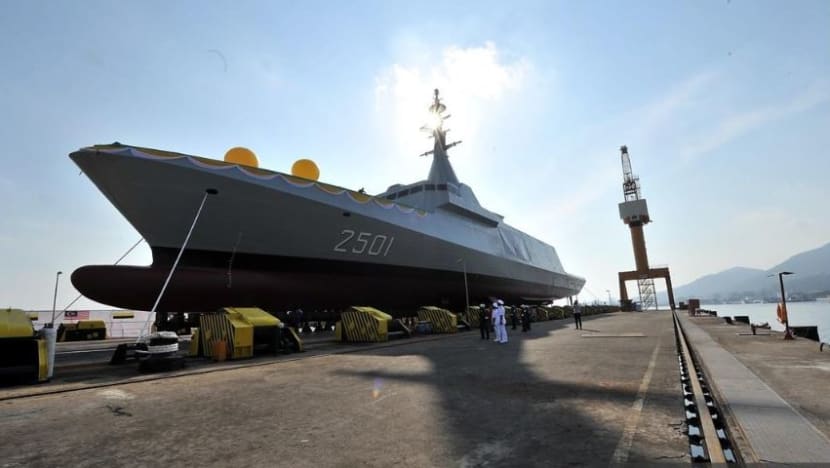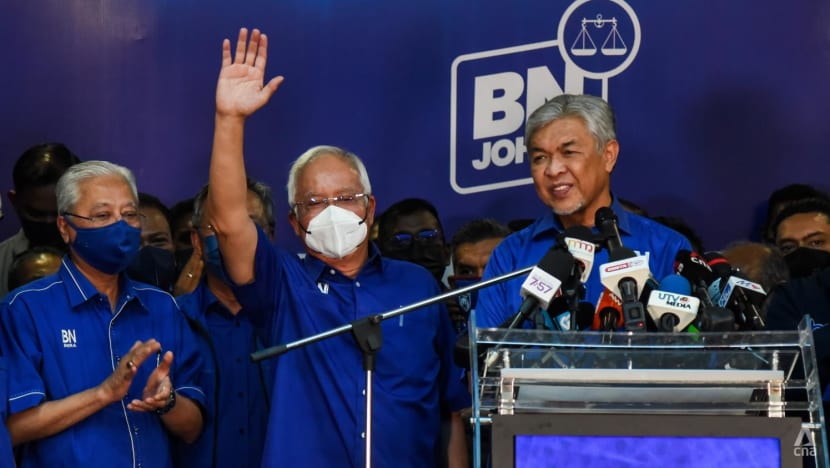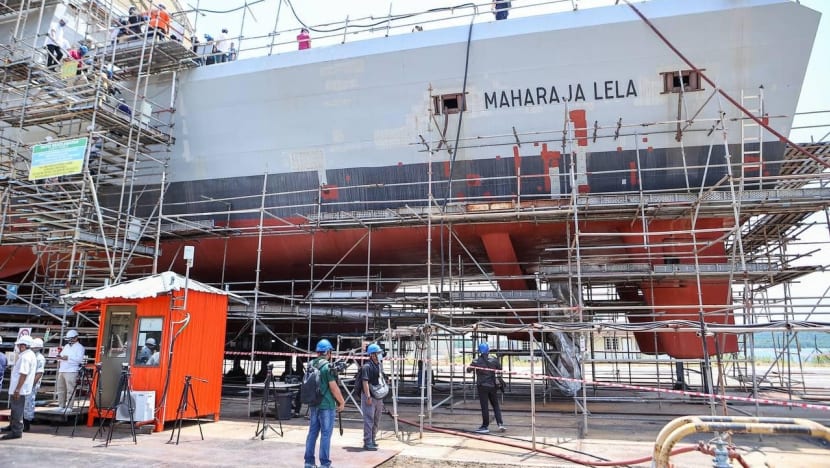CNA Explains: What was revealed in the declassified reports on Malaysia's warship procurement scandal?
Former defence ministers Najib Razak and Ahmad Zahid Hamidi were both involved in the deal to purchase six littoral combat ships from Boustead Naval Shipyard Sdn Bhd, a declassified report revealed.

KUALA LUMPUR: Since the tabling of a parliamentary committee’s report on Malaysia’s littoral combat ship (LCS) scandal, the Malaysian government has declassified two reports pertaining to the RM9.13 billion (US$2.04 billion) procurement.
The first was a report by the Special Investigation Committee on Procurement, Governance and Finance, which was set up by the Pakatan Harapan Cabinet in 2018, on the purchase of six littoral combat ships for the navy.
The report on the investigation led by former auditor-general Ambrin Buang was declassified following the Cabinet’s decision on Aug 10.
The second was the forensic audit report dated July 2020 by Alliance IFA (M) Sdn Bhd for Boustead Heavy Industries Corporation Bhd (BHIC). It was declassified on Aug 22.
According to the Malaysian parliament’s Public Accounts Committee (PAC), the project to construct six ships was awarded by the Ministry of Defence to Boustead Naval Shipyard Sdn Bhd through direct negotiation. Boustead Naval Shipyard is a company under the Boustead Heavy Industries Corporation Group.
The government has paid RM6.08 billion or 66.65 per cent of the cost so far but not even one of the ships has been delivered. According to the timeline, five ships should have been delivered to the government by August 2022.
On Aug 16, former managing director of Boustead Naval Shipyard Ahmad Ramli Mohd Nor on Tuesday pleaded not guilty to three charges of criminal breach of trust over the deal.
The 78-year-old, who used to be Malaysia's navy chief, was alleged to have authorised payments totalling more than RM21 million to three companies without the approval of the BNS' board of directors.
Prime Minister Ismail Sabri Yaakob promised that investigations into the issue will be carried out transparently and that the government will not protect anyone involved.
The declassified documents, among others, shed light on more details on the deal, including the ministers involved, the possible increase in costs and suspected irregularities.
INVOLVEMENT OF NAJIB AND AHMAD ZAHID
United Malays National Organisation president Ahmad Zahid Hamidi had previously denied his involvement in the LCS project, stating he was not the defence minister when the project was awarded.
He was quoted in Malaysian media on Aug 6 as stating that it was not reasonable to link the LCS project’s failure to him as he was not the defence minister when the project was awarded. He stated that he held the defence portfolio from April 2009 to May 2013.
“So any parties which caused the delay in construction should be responsible for explaining to the PAC,” Ahmad Zahid told the MalaysiaGazette, which was republished on UMNO’s portal.
However, the declassified report by the Special Investigation Committee on Governance, Procurement and Finance suggested otherwise.
Boustead Naval Shipyard’s then-managing director Vice Admiral (Ret) Ahmad Ramli Mohd Nor had written a letter dated Jul 8, 2010 to Ahmad Zahid, requesting for a letter of intent from the government for the LCS project.

At the top right of the letter, handwritten words “SUB perolehan, sila laksanakan (Under secretary of procurement division, please execute)” can be seen, followed by Ahmad Zahid’s signature and name stamp.
In the PAC report earlier, it was revealed by the deputy chief secretary of the special investigation committee Guna Arulalan David that the Royal Malaysian Navy had agreed and wanted the Sigma LCS design from the Netherlands for its ships, and was agreed on by the Defence Ministry’s higher management and then defence minister.
In an excerpt from the PAC proceedings dated Dec 1, 2020, Mr Guna Arulalan said the committee found that on May 26, 2011, Ahmad Zahid had agreed to the Sigma design and the TACTICOS combat management system from France’s Thales Group.
“But in the same year, on Jul 11, 2011, Ahmad Zahid agreed again to select the Gowind design. On Sep 26, 2011, agreed (sic) for the change in combat management system from the original to SETIS.” The Gowind design is from France.
“The French SETIS was also on the recommendation of BNS,” Mr Guna Arulalan told the parliamentary committee.
He also informed the PAC that the navy had not agreed to the proposal, but was forced to accept as the decision had been made by the ministry’s higher management.
Former prime minister Najib Razak, who was Ahmad Zahid’s predecessor at the defence portfolio, was also linked to the scandal.
The declassified investigating committee report showed that Boustead Naval Shipyard had applied to the government’s Economic Planning Unit (EPU) to carry out the construction of the six ships. It stated in a letter that discussions had been held with then-defence minister Najib at his office in October 2007.
The EPU replied in a letter saying that there were no obstructions in principle for the defence minister to start negotiation with BNS on the matter of the ships’ procurement.
On Jan 15, 2008, Najib, as defence minister at that time, requested for the Finance Ministry’s approval to issue a letter of intent to BNS.
The investigating committee noted subsequent interactions between BNS and Najib, who was finance minister in 2009, over both the LCS project and another Next Generation Patrol Vessel project.
COSTS OVERRUN
The declassified report by the investigating committee noted that the estimated costs of the six naval vessels could increase from the allocated RM9 billion to RM11.45 billion by mid-2019.
Previously, under the government’s EPU preliminary approval, a ceiling of RM9 billion was set for the project.
However, by Dec 11, 2014, the Finance Ministry had approved the defence minister’s request for the loan interest costs of RM128.6 million to be paid jointly by Boustead Naval Shipyard and the government at a 50:50 rate, bringing the LCS overall procurement cost to RM9.128 billion.
This was followed by another Finance Ministry approval following direct negotiations on procuring necessary integrated logistics support (ILS) equipment totalling RM600 million to Boustead Naval Shipyard, which now raised the costs to RM9.7286 billion.
The committee then highlighted that on Jul 16, 2019, Boustead Naval Shipyard had forwarded a request to increase the costs of the project by an additional RM1.416 billion.
It cited direct costs totalling RM58.41 million and indirect ones totalling RM1.358 million due to changes in equipment and the implementation schedule.
“This has turned the project’s overall cost estimate to RM11.145 billion (up until this report is presented to the defence minister),” the report noted.

POTENTIAL LOSSES DUE TO GROUP MISMANAGEMENT AND IRREGULARITIES
The declassified forensic audit report on the LCS project stated that Boustead Heavy Industries Corp Berhad could face potential losses of RM890 million.
In a table, the report summarised losses of up to RM23.368 million due to alleged payments to three companies for “fake services” related to the LCS project from 2011 to 2012.
Further down, the report noted that invoices for such non-existent technical evaluation services were a mode to siphon the funds, and named Alizes Marine as one such company. It added that the money released to Alizes Marine was suspected to be received by a Labuan-registered entity.
Other examples of mismanagement and irregularities detailed included double claims for the same services, but with different terms, which came up to RM537 million.
Another entry noted that Contraves Electrodynamics Sdn Bhd was issued multiple letters of award in its favour for the construction of the Boustead Integrated Technology Centre, which came up to RM305 million.
However, this technology centre’s cost was already factored into an original RM898 million letters of award issued by BNS for combat management systems to Contraves Advanced Devices Sdn Bhd.
The report also noted other instances of a lack of proper corporate governance, such as the predetermination of vendors before the government had issued its letters of award in favour of Boustead Naval Shipyard.
Major decisions were also made through a director’s circular resolution without convening a board meeting, thus further reducing transparency and the opportunity to discuss in detail and go through vital documents before approving the resolutions.
“Despite various red flags raised by ex-officers and associates of the company about the irregularities in the execution of the LCS programme, no corrective measures were taken either by the management or the Chairman of the board of BHIC to stop the abuse of power,” the report noted.
WOMAN LINKED TO COMPANIES USED TO SIPHON FUNDS
One issue the declassified audit report highlighted was the involvement of a Zainab Mohd Salleh.
She was director of Sousmarin Armada Sdn Bhd, a Malaysian-registered company which reportedly received RM8.26 million out of the RM23.368 million for “technical evaluation services” related to the LCS projects.
Mdm Zainab was also found to be the same person involved with Alizes Marine, and two other companies named Alizes Marine Limited registered in Malta and Labuan.
The audit also named her as the shareholder and director of Labuan-registered Intralogistics Limited, which appeared to be the parent company of Alizes Marine Labuan.
Separately, Parti Keadilan Rakyat deputy president Rafizi Ramli began to expose the mishandling of funds in the LCS project.
In an Aug 18 post on his Facebook account, Mr Rafizi, who was highlighting excerpts from the then-classified BHIC report, pointed to how Alizes Marine France was supposed to be the “spare parts supplier” for the project.

However, the forensic audit report noted that payments in favour of Alizes Marine France - which was not a French registered company - were made to “Alizes Marine Limited” with an account in Singapore.
On Aug 22, Mr Rafizi suggested that Minister in the Prime Minister’s Department Abdul Latiff Ahmad was also involved in the LCS scandal as he was linked to two offshore companies using the “Alizes Marine Limited” and “Alizes Marine Labuan” names.
Dr Abdul Latiff was deputy defence minister during Barisan Nasional’s rule before the 2013 general election.
Mr Rafizi was referring to page 96 of the forensic audit report, which showed a photo caption following several redactions stating that “It is noted that Abd Latiff is the spouse of Zainab”.
This resulted in some confusion, as netizens accused another Mdm Zainab Mohd Salleh, the chief financial officer of oil and gas company Dialog, as the individual in the report.
Dr Abdul Latiff issued a brief press statement denying that the Zainab Mohd Salleh mentioned in the news is his wife, without referring to specific reports.
“As a Cabinet member, I am prepared to fully cooperate should the authorities wish to investigate further,” he added.


















